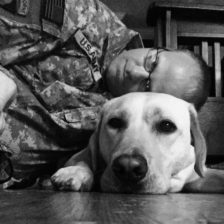Have you ever been startled? I have. I scare somewhat easily. I hate it. Imagine if you were in a combat zone and there were things that could startle you easily–bombs, hidden, not in plain sight. Loud noises. Gun fire. Not knowing where the gun fire was coming from or when to expect it.
Some Veterans have a startle response.
This might be from PTSD. Sometimes this is a defensive, a mechanism to cope with a sudden or threatening stimuli, or a sudden noise or sharp movement…sometimes people living with PTSD have a heightened sense of a startle response. It comes from hyperarousal, or feeling “keyed up” at any moment without time to really settle down and realize surroundings. Unwanted surprises, emotional turmoil…these things are not good at times. Sam has a startle response as a result of his PTSD.
How do we handle startle response?
This can be difficult…but there are some basic “rules” we follow to avoid startling Sam.
- Never walk up behind him…do not “surprise” him or try to approach him from behind. This will result in him becoming very jumpy, with a jerking movement to avoid whatever is behind him (remember, in the military days it could have been the enemy)…this is a big startling response and can sometimes leave him always looking over his shoulder. An example of this would be reading over his shoulder…that’s hard for him to handle.
- It is not okay to scare Sam (or anyone else for that matter, who may suffer from PTSD). Sneaking up, hiding behind a door or piece of furniture, coming out from a dark room, not good. The adrenaline rush that comes from being scared at that moment will also cause Sam to stay startled or keyed up for some time..his body will take longer to calm down from a situation like that. Not everyone is aware of how startling going on a mission can be, or how walking into a house full of bombs in total darkness may scare a soldier…do not even try to play a joke or prank when Sam is around…
- Being startled or surprised can actually interfere with a regular heart rate. At times, people who suffer from PTSD have a higher heart rate anyway, but if you were to do something that triggers this startle response…well, that could mean you are increasing their heart rate too. A normal heart rate for an adult is anywhere from 60-100 beats per minute. Sam’s heart rate is usually around 140-180.
- Do not place your hand on Sam’s shoulder unexpectedly–especially if you are standing behind him or in his peripheral vision. If he cannot see you, or he does not know you, this gesture will really freak him out. This startles him and could trigger memories that are invasive and unwanted at the moment.
- Loud noises…a car backfiring, sometimes banging of pots and pans, our washer kind of losing it and being very loud, gun shots…those can startle Sam and make him a little jumpy. When we are home and if he hears a loud noise he will be the first to say, “What was that!?”
- “Ninja-like Cat”–not that I am a ninja, but there are times when Sam might be reading, working in the garage, and then he says it is like I suddenly appear–I don’t necessarily come out of nowhere, but because he is so focused on something specific, it can really startle him if he doesn’t hear me (or the kids) enter a room. I have unfortunately done this a few times, and he jumps and usually gasps because he’s so caught off guard. Usually, we let him know where we are or call out to him so he can hear us if he cannot see us.
Hyperarousal can really come out of nowhere, with no real cause, or it can come when one is already anxious and maybe even over-stimulated. It is not funny to joke or surprise someone with PTSD. Anxiety can be high. Sam practices relaxation techniques (deep breathing, mindfulness), and sometimes he tries to avoid the situation by thinking of something else (like imagining a peaceful scene at the beach or the lake). Sometimes when any of these moments occur it can really take time for Sam to come down from being startled or worried.

Sam enjoying one of the dressing rooms at the Grand Ole Opry.
